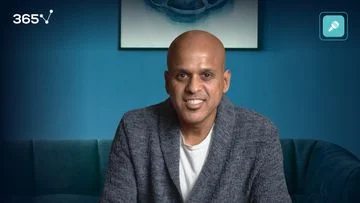
Breaking into data science is a long and winding road that requires technical and soft skills and a lot of resilience. We spoke to renowned industry experts and well-liked names in the data science community to discover how and when they knew they had what it takes for a career in the field. They shared their stories and the qualities they developed to succeed.
In this interview, we introduce you to one of the leaders in the data science community, Anastasia Kuznetsova. Rising from a graduate to a senior position in just three years, she shares her expertise with aspiring data scientists via her successful YouTube channel. Keep reading to learn more about her journey and when she knew she had what it took to succeed.
Interview with Anastasia Kuznetsova
Would you please tell us a bit about your background and journey into data science?
My journey into data science started with my formal education. I’ve studied Applied Informatics in Economics and Computer Science, where I gained a strong foundation in quantitative analysis and programming and an understanding of business economics and strategy. I believe this combination provided me with the skills and knowledge to pursue a career in data science.
My education also helped me develop a strong analytical mindset essential for data analysis. I learned to approach problems from multiple angles, consider different scenarios and possibilities, and question assumptions.
I continued to learn and develop my skills when I started working at King. There, I dove deeper into understanding the application of data analytics to specific business needs and goals and sharpened my technical capabilities, using Python and SQL daily. I learned how to communicate complex concepts to technical and non-technical audiences and developed my writing and presentation skills.
Overall, my formal education provided me with a strong foundation for my data science career, and I continue to build on that through ongoing learning and development.
When did you know you have what it takes?
Hmm, that's a great question! I think I started to realize I had what it takes when I saw the impact that my work had on the businesses I was working with. Seeing how the insights I provided helped stakeholders to make better, data-informed decisions was really satisfying. It made me feel that I was contributing something valuable and that my skills and knowledge as a data scientist were making a real difference.
Of course, there have been times when I've faced challenges or felt like I wasn't quite up to the task. But I've always been committed to learning and improving, one of the key traits that make you successful. And yes, I started working as a data scientist before I thought I was ready or “good enough.” It’s an important distinction for many people just starting their careers: You have to believe that you have what it takes to start and learn on the job, not to do it perfectly from the first day.
As a data scientist, one needs strong analytical thinking and a lot of technical know-how. What skills did you start with, and how did you develop them to meet the role requirements?
My background in mathematics, economics, and computer science provided me with a foundation in quantitative analysis, business understanding, and programming.
To develop my technical skills further, I learned languages like Python, R, and SQL.
In terms of developing my analytical mindset, I practiced looking at problems from multiple angles, considering different scenarios and possibilities, and questioning assumptions. For example, when I worked at King, I was responsible for analyzing player behavior to improve game design and user experience. To do this effectively, I had to be able to look at data from different sources and come up with creative solutions to improve the game.
Communication is also an essential soft skill for data scientists. I practiced my writing and presenting and learned how to convey complex concepts to technical and non-technical audiences.
My willingness to learn, adapt, and continuously improve has been the key to my success as a data scientist. I strive to stay up-to-date with the latest trends and techniques in the field. I'm always seeking opportunities to develop my skills and knowledge, such as attending courses, webinars, and industry events.
Learning is a lifelong process—especially in a field that’s as dynamic as data science. Is there something new you’d like to learn more about or become better specialized in?
One area that I'm particularly interested in exploring further is the ethics of artificial intelligence and how to implement safe and inclusive models. As AI becomes increasingly integrated into our lives, it's essential that these systems are developed and used ethically and responsibly.
I'm especially interested in exploring how to address issues like bias and discrimination in AI, as well as ensuring that these systems are designed and implemented in a transparent and accountable way. By developing a deep understanding of the ethical considerations involved in AI and staying up-to-date with the latest developments and best practices in this area, I can help ensure that AI is used to benefit everyone and minimize potential harm.
As an expert in the field, you must have an ample idea of the qualities a person needs for data science. What would you say those are?
That’s a very difficult question! There’s no perfect data scientist; different people have different skills that allow them to shine and be a perfect fit for their roles—but maybe not so perfect for other roles and companies. As a general rule, to be qualified for the data science role, one needs to have a certain profile, like having strong analytical thinking, technical skills like programming and data analysis, and good communication skills. You also need to be curious and willing to learn, have business acumen, and pay close attention to detail.
You need a mix of technical and soft data science skills and a passion for constantly improving and growing.
As the industry develops, the demand for skilled data scientists grows exponentially. What gives an aspiring data scientist a competitive edge in 2023?
Understanding the business problems and needs that data science can solve—as well as having a solid understanding of the industry and market context in which those problems exist—is becoming increasingly important.
Data scientists who have a good understanding of the business context and industry specialization can more effectively communicate their findings to stakeholders and make data-driven decisions that align with business objectives. This can include developing industry-specific knowledge in finance, healthcare, or retail or acquiring business knowledge through internships or other professional experiences.
Having a combination of technical skills, specialized knowledge in emerging areas, a strong data science portfolio, a network of professionals, a passion for learning and adapting, and a good business acumen and industry specialization can give aspiring data scientists a competitive edge in this fast-paced and evolving field.
We want to thank Anastasia for taking the time to provide valuable insights into what it takes to be a data scientist. Be sure to check out her YouTube channel where she makes videos on analytics, learning, career, and productivity, as well as her course on the 365 Data Science program, A/B Testing in Python.
Our aim at 365 is to equip you with the tools and give you the necessary guidance to succeed. Designed never to let you give up, the 365 Data Science platform has what you need to develop your qualities and skills.
Go from a beginner to a skilled professional who creates data-driven value. Study the statistics and probability theory behind data science with online courses led by our renowned instructors, and master sought-after skills like Excel, SQL, and Tableau. Prove you’ve got what it takes with industry-recognized certificates.




